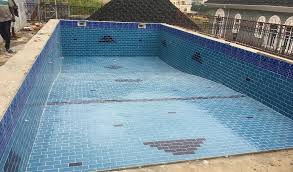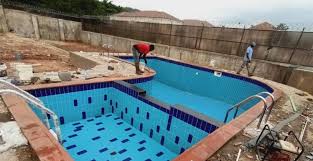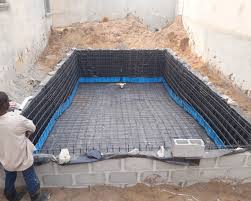![]()
If you’ve landed on this article page, you’re probably searching for a
good business idea—an idea that’s light on the pocket but heavy on
returns, promising both a fulfilling journey and potential profit.
|
Building a Swimming Pool in Nigeria: The
Ultimate Guide
Building a swimming pool involves several stages that require
professional expertise and careful execution.
Excavation: The first step is excavating the area where your
pool will be located. A team of experienced contractors will
carefully dig out the space according to the pool’s design
specifications.
Structural Framework: Once excavation is complete, steel
reinforcing bars (rebar) are installed to create a solid
foundation for your pool. This framework ensures stability and
longevity.
Plumbing and Electrical Work: Plumbing lines are installed to
connect various components of your pool system, such as filters,
pumps, and drains. Electrical work is also carried out during
this stage to power lighting features or other electrical
components.
Shotcrete or Gunite Application: Shotcrete or gunite is applied
over the rebar framework using specialized equipment to create a
solid shell for your swimming pool walls and floor. This mixture
consists of cement, sand, water, and sometimes additives for
reinforcement.
Tile and Coping Installation: Tiles are carefully placed along
the waterline of your pool, providing a decorative and
functional element. Coping, which is usually made of stone or
concrete, is installed around the pool’s edge to create a
finished look and serve as a transition between the pool and its
surroundings.
Filtration System Installation: The filtration system, including
pumps, filters, and other necessary equipment, is installed to
maintain clean and clear water in your pool. This system ensures
proper circulation and filtration for optimal water quality.
Finishing Touches: Once the main construction is complete, final
touches such as plastering or applying a waterproof coating to
the pool surface are done. This step enhances durability while
also providing an aesthetically pleasing finish.
Filling with Water: Finally, your pool is filled with
crystal-clear water sourced from either municipal supply or
well-water (depending on availability). Balancing chemicals are
added to ensure proper water chemistry before you can dive in
and enjoy your new swimming oasis.
The construction process may take several weeks, depending on
various factors such as weather conditions and any unforeseen
challenges that may arise during construction. It’s essential to
work closely with professional contractors who understand local
building codes and have experience in delivering high-quality
swimming pools.
Nigeria’s diverse and vibrant culture has led to an increasing
desire among homeowners to add amenities like residential
swimming pools to their living spaces, offering relaxation and
escape. These pools have become increasingly popular, providing
a luxurious and comfortable oasis within the tropical Nigerian
climate.
Budget and Financing: Building a swimming pool in Nigeria
requires careful financial planning. Several factors influence
the overall cost, including the pool’s size, design complexity,
chosen materials, additional features (such as lighting or
waterfalls), landscaping requirements, and labor costs in your
area.
To get an accurate estimate of your project’s cost, it is
recommended to consult with professional pool builders who can
provide detailed quotes based on your specific requirements.
Additionally, explore financing options available through banks
or specialized lenders that offer home improvement loans or
personal lines of credit specifically for pool construction
projects.
Remember to set aside some funds for potential unforeseen
expenses that may arise during the construction process. Proper
budgeting ensures that you can enjoy your new swimming pool
without any financial stress.
Remember to select plants that are suitable for the Nigerian
climate and require low maintenance. It’s also advisable to
consult with professional landscapers who can provide guidance
tailored to your specific needs.
A swimming pool can be a source of endless joy and relaxation,
but it’s essential to prioritize safety to create a secure
swimming environment, especially in a home setting. Accidents
around pools can have severe consequences, so taking proactive
steps to enhance safety is crucial. In this article, we will
explore the critical pool safety features and guidelines that
can help ensure a secure swimming environment for you, your
family, and your guests.
Pool Safety Features Ensuring a Secure Swimming Environment
1. Pool Fencing and Barriers
One of the fundamental safety features of any pool is a secure
barrier. This can be a fence, wall, or other enclosure
surrounding the pool area. Critical considerations for pool
barriers include:
The fence should be at least four feet high.
It should have a self-closing and self-latching gate that opens
away from the pool.
The barrier should be constructed in a way that makes it
difficult for children to climb over or crawl under.
2. Pool Covers
Pool covers are an additional layer of protection. Automatic or
manual pool covers can be used to cover the pool when it’s not
in use, preventing unauthorized access and keeping the pool
clean. Ensure that the cover is designed to support the weight
of a person so it doesn’t become a safety hazard.
3. Alarms
Pool alarms are electronic devices that can alert you to
unauthorized pool access. These alarms can be installed on
gates, doors leading to the pool area, or directly in the pool.
When someone enters the pool area, or the water surface is
disturbed, the alarm is triggered.
4. Rescue Equipment
Having essential rescue equipment, such as a life ring or
shepherd’s hook, readily available near the pool can be a
lifesaver in emergencies. These tools can help you reach and
assist someone in distress without putting yourself at risk.
5. Safety Rules and Education
Establishing and enforcing pool safety rules is essential.
Educate everyone who uses the pool on basic safety guidelines,
such as:
No running around the pool.
No diving in shallow areas.
No swimming alone, especially for young children.
Always supervise children closely in and around the pool.
6. Swimming Lessons
Ensure that all family members, especially children, have basic
swimming skills. Enrolling in swimming lessons can significantly
improve water safety and confidence in the pool.
7. First Aid and CPR Training
Being prepared for pool-related emergencies is vital. Learn and
regularly refresh your knowledge of basic first aid and
cardiopulmonary resuscitation (CPR) techniques.
8. Pool Lighting
Good lighting around the pool area is essential for safety,
especially if you plan to swim at night. Adequate illumination
helps prevent accidents and ensures clear visibility.
9. Regular Maintenance
Keep the pool and its surroundings well-maintained. Repair any
damaged or faulty safety features promptly and ensure the pool
area is free from hazards.
10. Emergency Contacts
Have a list of emergency contacts, including the nearest
hospital, posted near the pool area. Ensure that everyone using
the pool knows how to access help quickly in an emergency.
Which area is best for a swimming pool?
The best location for a swimming pool is typically in a level,
sunny area of your backyard with easy access from the house,
ensuring ample sunlight and convenience. Privacy, climate, and
zoning regulations should also be considered, and consulting
with a pool professional is advisable for personalized guidance.
What is a good size for a home swimming pool?
The ideal size for a home swimming pool typically falls around
12 feet by 24 feet with a depth ranging from 3 to 5 feet. This
site offers a good balance for swimming and recreation while
fitting well in various backyard settings. However, the specific
pool size should be chosen based on individual needs and
available space.
How deep should a swimming pool be?
The ideal depth of a swimming pool depends on its purpose.
Residential pools typically range from 3 to 5 feet, suitable for
various recreational activities. Some may include deeper
sections for diving. Commercial and competitive pools adhere to
specific depth regulations for different activities, such as
water polo and diving. The pool depth should match its intended
use and comply with safety and regulatory guidelines.
What kind of pool is easier to maintain?
Fiberglass pools are the easiest to maintain among different
pool types, like concrete or vinyl liner pools. Their smooth,
non-porous surface resists algae, reduces the need for extensive
chemical treatments, and simplifies cleaning. Built-in steps and
benches, as well as the absence of surface joints, make
fiberglass pools a low-maintenance option, requiring less time
and effort to keep the water clean and balanced.
Bottomline
Designing a pool in Nigeria requires careful planning and
considering various factors such as climate, local insights, and
personal preferences. By incorporating suitable landscaping
elements, water features, outdoor seating areas, and lighting,
you can create a stunning oasis that reflects your style and
meets the needs of your family. Remember to consult with
professionals and conduct regular maintenance to ensure your
pool remains a safe and enjoyable space for years to come.
To ensure the project is successful, it’s essential to work with
experienced professionals who understand local conditions and
can offer expert advice on design, materials, and safety.
Ultimately, whether it’s for personal enjoyment or business, a
swimming pool can be a worthwhile investment if carefully
planned and maintained.
Get our Practical Training Guide on How to set up a swimming pool building Business in Nigeria. Our comprehensive guide will help you to make money as a swimming Pool builder, covering initial considerations, design ideas, construction, and maintenance.
|







